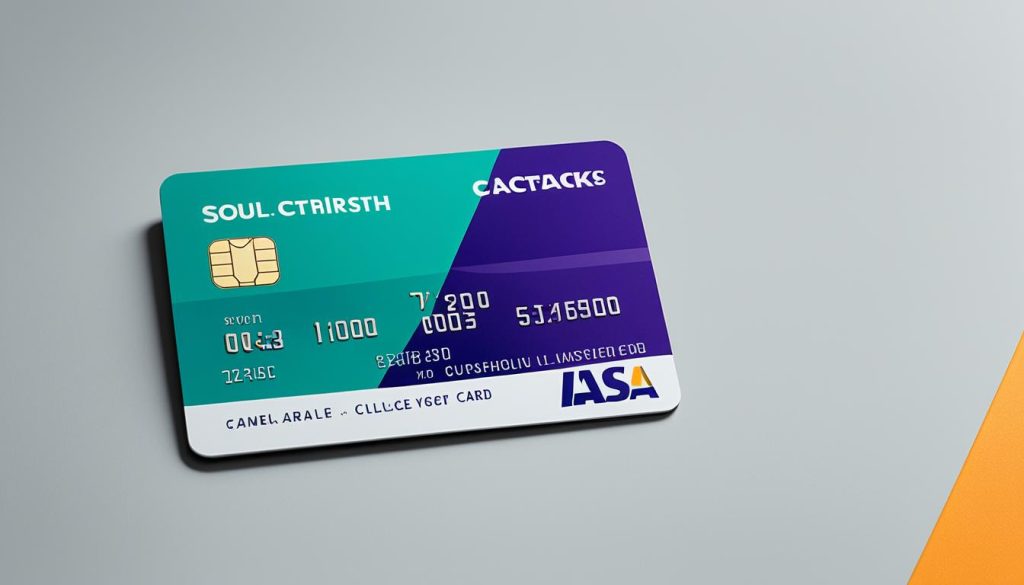Establishing a solid financial foundation is crucial if you want to secure a financially stable future. One key aspect of that foundation is understanding the importance of your credit score. Whether you’re planning to buy a home, get a car loan, or finance your education, having a good credit score is essential for loan approval and obtaining favorable interest rates.
Unfortunately, approximately 45 million Americans don’t have a credit score, putting them at a disadvantage when it comes to financial opportunities. But don’t worry, building credit is achievable, and we’re here to help you get started.
Key Takeaways:
- Establishing credit is crucial for major financial decisions.
- Approximately 45 million Americans don’t have a credit score.
- A credit score is a numerical representation of your credit history.
- Building credit responsibly involves various methods.
- Maintaining a good credit score requires on-time payments and managing credit utilization.
What is a Credit Score and How to Build Credit
A credit score is a numerical representation of an individual’s credit history. It provides lenders with a quick assessment of a person’s creditworthiness. The FICO scoring system is widely used in the industry to calculate credit scores. This system categorizes credit scores into different ranges, ranging from bad credit to excellent credit.
Building credit responsibly is crucial for establishing a strong financial foundation. There are several methods individuals can employ to build credit and improve their credit score:
Become an Authorized User
Becoming an authorized user on someone else’s credit card is a great way to start building credit. By being added to an account with a positive payment history, individuals can benefit from the primary cardholder’s responsible credit management. It’s important, however, to choose a primary cardholder who practices good credit habits to avoid any negative impact on one’s credit score.
Co-sign on a Credit Card or Loan
Co-signing on a credit card or loan with a trusted individual who has a good credit history can help build credit. Both parties share the responsibility for repaying the debt, and the positive payment history will be reflected on each person’s credit report. It’s important to ensure that the co-signer is reliable and responsible with their credit.
Pay Rent on Time
Although rental payments are typically not reported to credit bureaus, there are services available that can help individuals build credit by including rental payment history in their credit reports. Paying rent on time consistently can demonstrate responsible financial behavior and help build credit.
Manage Student Loan Payments
For those with student loans, making regular, on-time payments is crucial for building credit. Loan repayment history is reported to credit bureaus and reflects the individual’s ability to manage their debt. By making timely payments, individuals can demonstrate their financial responsibility and improve their credit score over time.
Use a Credit-Builder Loan
A credit-builder loan is a specialized type of loan that helps individuals build credit. The borrower makes regular payments into a savings account, and once the loan is paid off, they have access to the savings. This type of loan allows individuals to establish a positive payment history and demonstrate their creditworthiness to lenders.
Apply for a Secured Credit Card
A secured credit card is an excellent option for individuals with limited or no credit history. With a secured credit card, individuals provide a security deposit that serves as collateral in case of non-payment. Regular and responsible use of a secured credit card can help individuals build credit over time.
Building credit responsibly takes time and patience. It’s important to use credit responsibly, make timely payments, and avoid accumulating excessive debt. By following these strategies, individuals can lay the groundwork for a strong credit history and improve their credit score.
How to Maintain a Good Credit Score
Once you have established your credit, it is important to take the necessary steps to maintain or improve your credit score. By following these key practices, you can ensure that your credit remains in good standing and continue to build a solid financial foundation for yourself:
- Make on-time payments: Paying your bills on time is crucial for maintaining a good credit score. Late payments can negatively impact your credit, so it’s important to stay organized and make payments by their due dates.
- Pay balances in full: Whenever possible, try to pay off your credit card balances in full each month. This demonstrates responsible credit management and helps keep your credit utilization ratio low.
- Manage credit utilization: It’s advisable to keep your credit card utilization below 30% of your available credit limit. High utilization can indicate a dependence on credit and may lower your credit score.
- Keep old accounts active: Closing old accounts can actually have a negative impact on your credit score. Instead, keep them open and use them occasionally to maintain an active credit history.
- Open new accounts responsibly: Opening new credit accounts can help diversify your credit mix, which is beneficial for your credit score. However, it’s important to do so responsibly and avoid excessive new credit applications.
- Maintain a mix of revolving and installment credit accounts: Having a healthy mix of credit types, such as credit cards (revolving credit) and loans (installment credit), can demonstrate to lenders that you can manage various forms of credit responsibly.
- Regularly check your credit report: Monitoring your credit report is essential for detecting any errors or signs of potential fraud. By checking your credit report periodically, you can take swift action to rectify any issues and protect your credit standing.
By incorporating these practices into your financial routine, you can maintain a good credit score and ensure that your credit remains strong. Remember, a good credit score opens doors to favorable loan terms, better insurance rates, and more financial opportunities.

Credit-Building Strategies for College Students
College students have the unique opportunity to establish a solid credit foundation that will benefit them in the long run. By understanding credit basics and utilizing credit-building services, students can pave the way to a healthy credit profile. Here are some effective strategies that college students can employ to start building credit:
- Become an Authorized User: Consider being added as an authorized user on a trusted family member or friend’s credit card. This can help you establish credit history and benefit from their responsible credit behavior.
- Apply for a Secured Credit Card: Secured credit cards are a great option for those with limited credit history. By putting down a refundable security deposit, you can obtain a credit card that reports to credit bureaus, allowing you to start building credit.
- Monitor Your Credit Report: Regularly checking your credit report ensures that you stay informed about your credit standing. This enables you to identify any errors or potential fraud that may negatively impact your credit score.
- Pay Bills on Time: Consistently paying bills, such as rent, utilities, and student loans, on time demonstrates responsible financial management and contributes to a positive credit history.
- Consider a Student Credit Card: Many credit card issuers offer student credit cards specifically designed for college students. These cards often have lower credit limits and tailored benefits aimed at helping students establish credit.
Building credit as a college student requires discipline and responsible financial habits. By following these strategies, you can lay a strong foundation for your financial future and be on your way to a healthy credit score.

“Establishing good credit early can open doors for future financial opportunities and set you up for success.”
Understanding and Managing Credit Reports
Credit reports play a crucial role in providing a comprehensive overview of an individual’s credit history. These reports are used by lenders, employers, and insurance companies to assess creditworthiness and make important decisions. It’s important to understand the various components of a credit report and how to manage them effectively.
What is Included in a Credit Report?
A credit report contains a wealth of information about an individual’s credit history. It includes basic information such as the individual’s name, address, date of birth, and social security number. The report also includes details about the individual’s creditors, such as the names of the lenders, account numbers, and the type of credit (e.g., credit cards, loans).
“A credit report provides a comprehensive snapshot of an individual’s financial health, serving as a window into their creditworthiness and responsible financial behavior.”
In addition to the basic information, a credit report also includes potentially negative items. These may include accounts in collections, late payments, judgments, bankruptcies, or tax liens. On the flip side, credit reports also highlight accounts in good standing, which showcase responsible credit management and timely payments.
Furthermore, credit reports disclose any recent requests for an individual’s credit history. These requests can be made by lenders when considering a loan application or by the individual themselves when monitoring their credit. It’s important to keep track of these requests to be aware of who has accessed the credit report.
Lastly, credit reports include personal information such as current and previous employment history, as well as any public records related to the individual, like evictions or foreclosures.
Managing and Monitoring Credit Reports
It’s crucial to regularly review and monitor credit reports to ensure accuracy and identify any potential issues. By doing so, individuals can take corrective actions and improve their credit standing. Here are some essential steps to manage and monitor credit reports:
- Request and review a free copy of the credit report from each of the three major credit reporting agencies – Experian, Equifax, and TransUnion – once a year.
- Check the report for any errors, discrepancies, or fraudulent activity. If any issues are found, it’s important to dispute the inaccuracies with the respective credit reporting agency.
- Keep an eye on potentially negative items that may be affecting the credit score. Taking steps to resolve them, such as paying off outstanding debts or setting up payment plans, can have a positive impact on the credit report.
- Maintain open and active accounts in good standing to demonstrate responsible credit management. This includes paying bills on time and keeping credit card balances low.
- Consider enrolling in credit monitoring services that alert individuals about changes to their credit reports. These services can provide an extra layer of protection against identity theft and other fraudulent activities.
By understanding and actively managing credit reports, individuals can take control of their financial well-being and make informed decisions about credit applications, loan approvals, and other important financial matters.

Conclusion
Building and maintaining a good credit score is essential for financial success. By understanding credit scores, building credit responsibly, and regularly monitoring credit reports, individuals can lay a strong financial foundation for themselves. Taking the necessary steps to improve credit and maintain good credit habits will open up opportunities for favorable loan terms, insurance rates, housing, and employment. It’s never too early to start building credit and securing a solid financial future.



No comments! Be the first commenter?